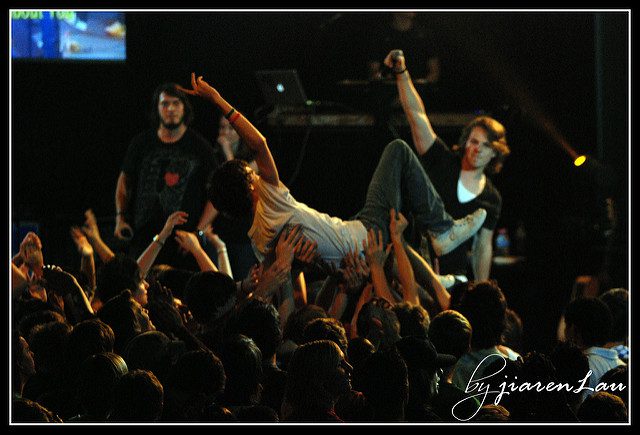In a recent Church Leaders article, Jamie Brown fretted about the state of evangelical worship. He fears the “performancism” found in the modern worship culture will ultimately lead to a crash.
I actually agree with him on a number of his points, but the sad reality is that his greatest fears have come true.
It’s too late.
I’m calling it.
Evangelical worship has crashed, and entertainment culture has killed it.
Don’t believe me? Check out a few clips from some of the largest evangelical churches and networks.
Performance worship is now the norm. I fear this is the case with practically all evangelical megachurches and their emulating congregations, which now includes a growing number of desperate mainline congregations, as well. We also see it in the hip, edgy, urban emergent congregations that tout their return to liturgy, but still find themselves enslaved to commercial entertainment forms. Yes, performance worship has killed worship, and it’s done it in several key ways.
Entertainment worship substitutes performance for liturgy. Our new worship language even reflects it. We once had sanctuaries, but not we have “auditoriums.” We once had chancels, now we have “stages.” We once had altar guilds, now we have “weekend stage managers.” We once had a liturgy, now we have a “performance set” (some call this a “worship set” in an effort to maintain some decorum). We once had worship services, masses, liturgies, now we have “traditional” or “contemporary” worship, “modern” worship, worship “experiences.”
At the heart of these changes is a focus on customer service. We want to offer a performance product that will rival anything offered by mainstream commercial entertainment so that they will choose to park their butts in our seats.
Congregations built on entertainment, provided by a combination of rock musicians and celebrity pastors, to be blunt, are more orgasmic than organic. The slavish, masturbatory pursuit of the feeling itself inevitably leads to the worship of something other than Christ. It rejects the Christian story in favor of our own. It rejects true human connection in God’s church and replaces it with introspective preoccupation. It ends with the narcissistic worship of self. It can deliver a spark, yes, and it may get butts in the seats, but in the end, it leaves us wanting. The excitement over the bright shiny objects that attract masses today will eventually wane, and the church will have to offer something brighter and shinier to hold out hope for the future.
Oh, and when we’re successful at selling our worship product, we call that “evangelism.”
Entertainment worship substitutes commercial music for worship. Music is the sacrament of the performance worship culture. Instead of gathering to tell the Christian story – our story – we gather to “worship” (sing along with a musical performance) and hear a sermon. We talk about “worship bands” and “worship leaders” and “worship time” before the speaker comes to deliver the message, we have lost sight of what constitutes an act of worship. Corporate prayer, creeds, confessions, have no place. No more gathering, proclaiming, thanksgiving, and sending out. Just music, sermon, more music.
Entertainment worship diminishes the congregation’s role. The congregation’s only job is to sing along, but performance worship doesn’t really require that, either. They use music crafted in the style of commercial performance genres, which doesn’t lend itself well to congregational singing. The band is amplified, and the worship leader and team sings into their mics as if they were giving a performance. The congregation’s voice is ancillary at best, and irrelevant at worst. Performance worship sends the message that there participation doesn’t matter, only their feelings of enjoyment matter.
Entertainment worship turns worshipers into self-centered consumers. The goal of entertainment worship is to offer a product that will amuse people. The highest priority, then, must be a satisfied customer.
Though the megachurches continue to grow at the expense of the local congregations, the cracks are showing. Worship attendance is declinining and not just among the oft-maligned mainline traditions. Older generations are (to put it mildly) aging out. Younger generations are growing up with no cultural/social use for the church. And what’s worse, they can sense the emptiness of the marketing scheme; the targeted attempts of performance worship culture to attract young people are offensive, and will continue to lose their effectiveness.















